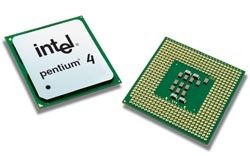Larger cache to keep Pentium 4 competitive until arrival of dual-cores
Chicago (IL) - Intel's decision to cancel the 4 GHz Pentium 4 580J shifts the bragging rights for the fastest desktop processors into AMD's hands for some time. The Athlon 64 FX-55 and 4000+ outpace Intel's processors on paper as well as in benchmarks. Intel plans to stay competitive with larger cache sizes until dual-core chips are available.
It was no easy move for Intel to scrap plans for a 4 GHz Pentium. At least it was serious enough that Chief Executive Officer Craig Barret brought the topic up at a conference of market research firm Gartner yesterday and apologize in front of a crowd of 4000. The firm's announcement is the most significant public step so far to highlight multicores as the next generation volume processor architecture.
"It was a difficult trade-off," said Platform Marketing Manager Jeff Austin. "It was not that we couldn't get there. But at some point performance and power consumption do not scale in an optimal way anymore." Sources also indicated that Intel was confronted with manufacturing problems of the 4 GHz chip. Instead of the common practice to increase the frequency, the company decided that it was time to focus on its "long term strategies" and dedicate "critical" resources to dual-core and multicore architectures.
By the end of 2006, Intel believes that 40 percent of the performance desktop segment will be dual-cores. At the same time, 70 percent of the performance notebook range will be dual-core, Austin said.
Competitor AMD on the other hand appears to be able to scale its Athlon 64 just fine. The introduction of the 2.6 GHz FX-55 and 2.4 GHz Athlon 64 4000+ takes the speed crown in many disciplines from Intel's Extreme Edition processors. An AMD spokesperson confirmed that AMD intends to scale its processors throughout the foreseeable time which - for the first time in more than three years - may provide AMD with an opportunity to increase its performance lead on the high-end.
Intel's Austin did not specifically comment if a higher frequency Pentium 4 will appear on the market before the launch of the dual-cores. "This is not our focus," he said. According to sources, Intel will launch its first dual-core processors in the third quarter of 2005.
Compared to the current 5xx-series, the processors will integrate 2 MByte L2 cache, instead of the current 1 MByte. Austin agreed that increasing the cache "certainly" can be considered as an "extension of the life time" of the processor. "The larger cache will be a very competitive solution," he said. According to sources, models offered will include the 630, 640, 650, 660 and 670 with the latter being scheduled for the second quarter of 2005. Clock speeds will range from 3.0 to 3.8 GHz.
Get Tom's Hardware's best news and in-depth reviews, straight to your inbox.
While AMD may have a good shot a being able to brag about offering the fastest processor, analysts believe that Intel's business will not suffer dramatically. "This really is a non-issue," said Dean McCarron, principal analyst of Mercury Research. "The very top of the segment represents little volume." He considered Intel's decision as an appropriate step, since the company "apparently could hit a certain level of performance easier with an increase of cache."
Intel spokeswoman Agnes Kwan explained that announcement to cancel a 4 GHz processor does not mean that the company will not hit 4 GHz at some time. Multicore as well as single-core processors are likely to be offered with 4 GHz at some point, she said. This also is an indication that Intel does not intend to abandon its single-core processors completely. "The architecture is not dying," MCCarron said. "There always will be applications, such as office software, cannot exploit the capabilities dual-cores."

Wolfgang Gruener is an experienced professional in digital strategy and content, specializing in web strategy, content architecture, user experience, and applying AI in content operations within the insurtech industry. His previous roles include Director, Digital Strategy and Content Experience at American Eagle, Managing Editor at TG Daily, and contributing to publications like Tom's Guide and Tom's Hardware.
